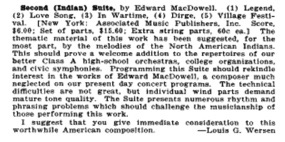In our studies of Native American music, I have come across the name “Edward Macdowell” several times. Most recently in an article by Daniel Blim entitled “Macdowell’s Vanishing Indians.” This peaked my interest in the composer to see what his general reception was amongst the musical community. Much of his music uses themes from Native Music that is fraught with problems in respect and appropriation (to modern listeners), as can be represented by the Blim article. There are two reviews of Macdowell that I will be exploring to do this, one from 1944 in the Music Educators’ Journal and one from American Music in 1987.
The first review takes Macdowell’s Second “Indian” Suite under fire as a piece for High School Orchestra. The full text is short and is reproduced below:
The piece is lauded for its musical accessibility and distinct “Americanness” and its ability to rekindle interest in Macdowell, who it describes as “much neglected on our present day concert programs.” The only acknowledgement of source material in this (very short) review are that the melodies are suggested by the North American Indians. The score can be found here, for reference to the melodies that it describes. Despite the short nature of this review, there are a few things we can safely extrapolate from it. The first surrounds the “much neglected” comment. This shows that Macdowell was not a key facet of many, if any, concert programs in 1944, just 36 years after his death. The reason for this is not specified, but it does go to show that the use of such Native American Melodies was not popular for composers to do, as Macdowell did with a number of pieces (he has at least two full Indian Suites as the title of the piece suggests). This could be for a number of reasons, among them being a general disdain for non-white-sounding music (possible, but severe speculation) or a loss of interest in the music of American Composers who weren’t Aaron Copland (again, speculation).
The second review is much longer, and is regarding a recording of several piano works by Macdowell. For our purposes, we can just look at the material regarding the piano work itself. The reviewer, Margaret Barela, found Macdowell to be compositionally important to the development of American Music, but not because he “lacked foreign influence.” Barela likens Macdowell’s music to that of Liszt and Chopin, although Chopin died before Macdowell was born and Liszt died when Macdowell was 26, so they were not contemporaries. Barela praises the first two sonatas of Macdowell for their narrative splendour, but had little good to say about the second two. This might shed some light on why Macdowell was “much neglected,” even by the 1940s. Macdowell, while an important composer in the development of American music, did not do enough to revolutionize it to gain a spot on the pedestal of history that we historians reserve for the “greats.” It would indeed be ironic if the music of Macdowell “vanished” with history, just as his Indians did.
Works Cited
Barela, Margaret Mary. American Music, vol. 5, no. 2, 1987, pp. 231–233. JSTOR, www.jstor.org/stable/3052177.
Louis G. Wersen. Music Educators Journal, vol. 30, no. 4, 1944, pp. 42–42. JSTOR, www.jstor.org/stable/3386289.


I’d be interested to know which of your two sources you think constitutes a “primary source” and for what topic, exactly, it is primary. Since both of these pieces were published at some remove from MacDowell’s lifetime they don’t quite qualify as “eyewitness” accounts to help us learn more about him or about the time in which he lived. Nor do they shed much light on his relationship with Native American music, or on that music in its own right. Both sources – but especially the 1987 source, published in an academic journal – seem secondary to me, which means you might need to go back to the drawing board to find a true primary source on MacDowell or on Native American music.